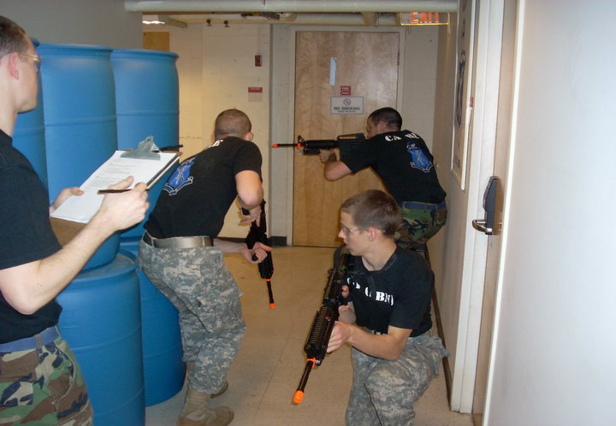
On April 20, 1948, this expansion reached the Massachusetts Institute of Technology, and Hotel Company, 5th Regiment, National Society of Pershing Rifles was established as a military honor society, focusing mainly during this pre-Vietnam era on drill and marksmanship and serving as the MIT color guard for institute functions. By May 1957, P/R H-5 was also the headquarters of one of the eleven regiments in existence nationally.
By the mid 1960s, a group of MIT students recognized that military honor societies specializing in close order drill and ceremonious pageantry must be replaced by those that emphasized individual physical training and squad tactics. As a new generation of American sons were exposed to their trial by fire in Vietnam, these MIT students formed the MIT Counterguerilla (CG) Unit on September 19, 1966, as the first unit of MIT students of any type to practice tactics. Self-consciously patterned after a United States Army Special Forces A-Team, the CG Unit held four field training exercises each semester, usually amphibious, airmobile, rappelling, and tactical reviews.
The Commando Group continued this tradition when it formed the nucleus of a fusion with the tri-service drill and rifle teams and was rechartered on April 24, 1972, as Charlie Company, 12th Regiment, Airborne, National Society of Pershing Rifles. Even C-12 (ABN)'s drill and rifle platoons grew during these years. The drill team expanded so rapidly that they perfected intricate drill routines performed in parades such as the Bicentennial Patriots' Day Parade with 750,000 spectators, including President Ford.
The seed that had been planted by the founders of the MIT Counterguerilla Unit had grown tall and strong. Despite having changed its name twice in under a decade, this organization was one continuous entity and, after years of growth and expansion, in numbers, abilities, and scope of operations, the company was a strong, confident, aggressive, and cohesive organization with a clear sense of purpose and direction, heightened by the knowledge that many members would serve their nation in Vietnam. While much training focused on land tactics during this period, Navy and Air Force members were a strong constituency in addition to Army cadets.
In 1996 and 1997, C-12 (ABN) initiated a cathartic self-examination and reorganization to clarify its mission, renew its tri-service and civilian appeal, and reestablish tactical and drill exercises. It is this C-12 (ABN) Company that hails old alumni and welcomes new members.
